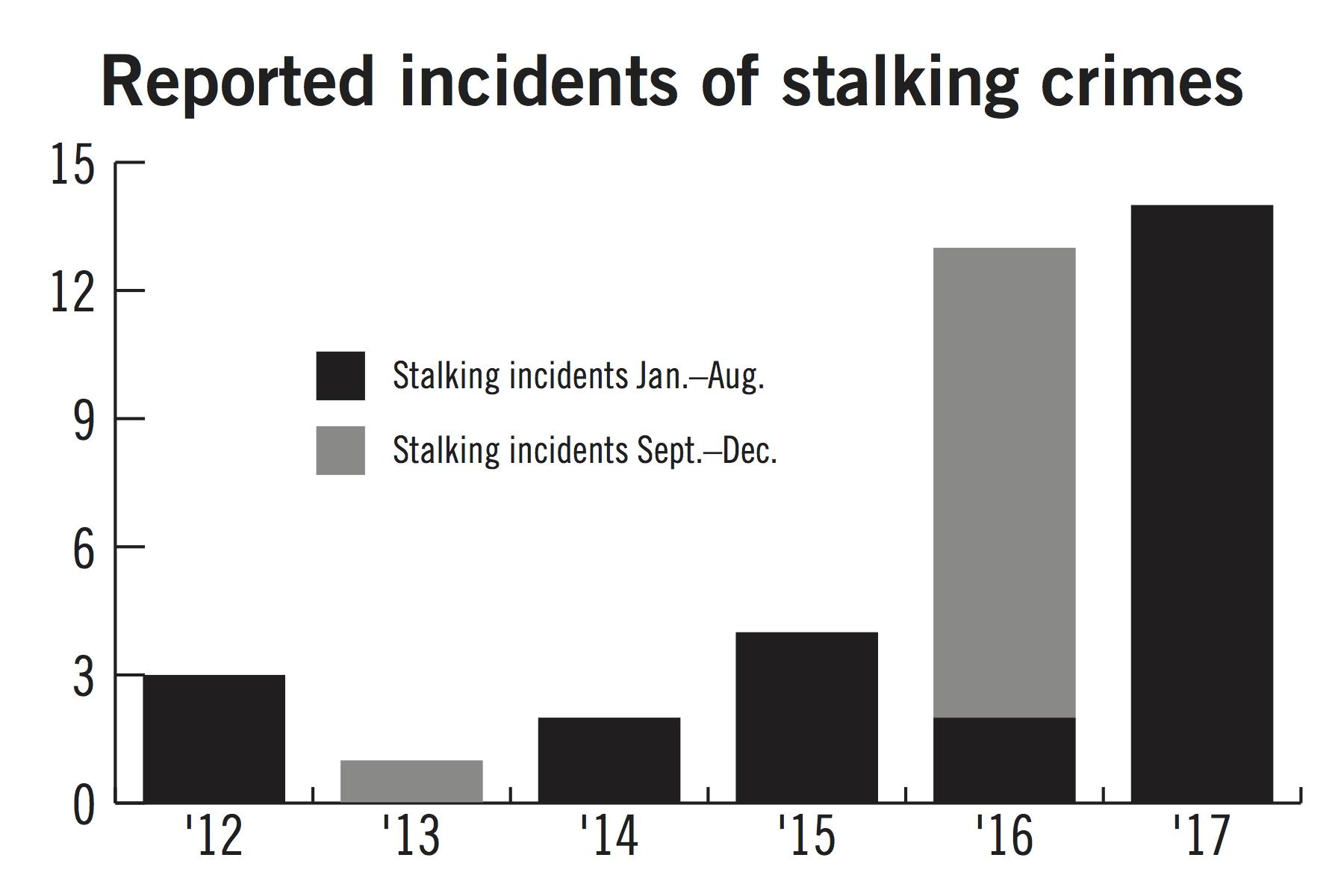
Yonah Bromberg-Gaber | Graphics Eidtor
Source: GW Crime Log
Stalking incidents reported to the University Police Department have surged within the past year.
There have been more stalking cases reported to UPD through August of this year than in any other year since at least 2012, according to an analysis of the GW crime log. UPD Chief RaShall Brackney said the department has not changed how it classifies stalking cases, but the increase could indicate that members of the community are now more willing to report incidents.
So far this year, 14 stalking cases have been reported to UPD, compared to just two incidents at this point last year and 13 recorded in all of 2016. Brackney said while crime in general varies year to year, electronic stalking has been on the rise in recent years because more people are using technology.
The total number of reports last year reached nearly four times the number documented in all of 2015. Between 2012 and 2015, the average number of reports was slightly more than two, with a peak of four in 2015, according to the crime log.
In comparison to other urban universities and peer schools, GW’s recent number of stalking incidents is high. Georgetown University has recorded no reports of stalking in 2017 and just one in 2016. New York University has not documented any stalking incidents so far this year and reported five in 2016.
Brackney said the increase was a sign that students, faculty and staff feel confident reporting incidents.
“We appreciate that the GW community feels comfortable contacting GWPD for support, guidance and information when they feel they are in unsafe situations,” Brackney said in an email. “This enables us to be able to investigate and provide further assistance as needed.”
Brackney added that initial stalking reports may be reclassified or dropped altogether after they are investigated further. Students that feel threatened should contact UPD or utilize the GW PAL safety app, which students can use as a silent alarm for UPD, she said.
UPD defines stalking as following, watching, threatening or communicating with a person causing them to fear for his or her or another person’s safety, Brackney said.
Brackney declined to say if there are any areas on campus where stalking reports are consistently occurring and if stalking protocols or enforcement have changed in the last few years.
GW’s crime log also encompasses off-campus incidents reported to UPD. So far this year, three of the 14 reported stalking incidents happened off campus, compared to five of the 13 cases in 2016.
Bailey Bystry, the vice president of Students Against Sexual Assault, said the group considers stalking to be a form of sexual violence. Although SASA has not noticed an increase in stalking cases specifically, they have seen an increase in overall reports of sexual violence, she said.
Many of the stalking cases where SASA has worked with survivors involve a perpetrator who commits sexual violence and then stalks a survivor, she said. Violence between romantic partners on campus, including stalking, often occurs out of sight, she added.
“There’s a big culture of intimate partner violence on this campus that people don’t talk about as much.” Bystry said. “People who are in unhealthy relationships – you can be stalked when you’re still in a relationship, you can be stalked after you’ve ended a relationship or anything in between.”
More than 61 percent of female stalking victims and 44 percent of male stalking victims nationwide were stalked by former intimate partners, according to the Stalking Resource Center at the National Center for the Victims of Crime.
Experts specializing in sexual crimes and campus safety said the number of stalking crimes could spike at a university because of how police define stalking, a general increased awareness of what constitutes stalking or survivors reporting incidents at a higher rate.
Laura Palumbo, the communications director for the National Sexual Violence Resource Center, said a recent amendment to the Violence Against Women Act could be responsible for increased reports of stalking.
Under the amendment, the federal government requires colleges to record incidents of domestic violence, dating violence and stalking beginning in 2014, crimes that were previously rarely reported at GW.
“Stalking was, for the first time, really called out as an area for universities to provide support for their students,” she said.
Justin Ramsdell, a professor of psychology at George Mason University, said in the past, survivors did not want to report incidents. A survivor may opt not to report stalking because survivors may blame themselves if the stalker was a former partner, he said.
“Since many of the stalkers are former intimate partners, the victims may feel that they brought this upon themselves, so self-blame plays a role,” he said in an email. “The adequate collection of evidence plays a role, the ability of law enforcement officers to treat stalking as a legitimate crime plays a role.”
Brooke Migdon contributed reporting.



